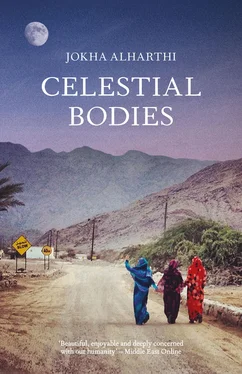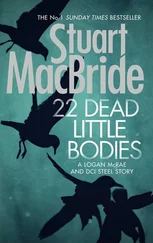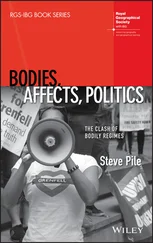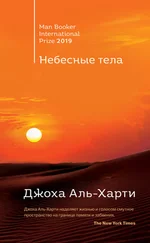From the start they shared a clear sense of what this was. A free relationship. Freedom, yes, in this bond they had made. At first it did really seem that they had climbed to the summit of pure desire, free of artificiality, concealment, or deception. Between themselves, anyway. No promises made, no aspirations hinted, just each moment’s blaze of passion. No ties from the past and more important, no ties to the future. That’s what they wanted and worked for. A few weeks later Azzan discovered that this free relationship was collapsing into the roughest and most violent sort of slavery, driven by need, binding them in irons. It distracted him from everything else, as he saw this unending cycle of union and separation enveloping them, slaves to a vicious cycle of never-ending demands and doubts. His need for her was profound, as violent and as obscure, too, as it seemed, all the more so when he was actually with her. But now, reaching home, Azzan opened the massive wood door calmly, thinking, That’s the way it is. There’s no freedom in love, and you can’t choose — others are there, or they’re not. He walked through the courtyard without noticing the lamp lit in the girls’ room. Entering the sitting room, he found everyone there, alert and tense, waiting for him to come home. Except for Khawla.
Cocooned in a big green wool shawl, Mayya was nursing her baby girl. Asma was with her, patting the newborn girl’s swaddling into place, and avoiding raising her head. Salima was hunched over, but in her crouching posture she still glared at him. He took off his shoes and sand dribbled from his toes. She did not stand up and come over as she usually did. He rubbed at his beard once or twice and asked, What’s going on?
Your daughter Khawla shut herself up this morning and refused to talk to anyone until you were back, Salima said. Azzan put his shoes back on and returned to the courtyard. He knocked softly on the door to his daughters’ room.
Salima sighed. A puff of cold breeze, a gentle brief rain pour. Winter reminded her of her childhood, though when she remembered childhood she felt a thin thread of bitterness wrapping tightly around her heart. She was floating in a soft gloomy cloud; no, she was lying on jagged rock. She saw her father. She always saw him in two images that came to her in a dream. He was bending over her, drops of cold ablution water dripping from his beard, to hoist her onto his shoulder, with her brother Muaadh on his other shoulder. In the other image he aged and then died, all in a cold winter. Salima hated the wintertime. It seemed to carry the smell of the rough wool blanket and the sheet that shrouded her father, and also the coals that warmed the room where he was dying.
Khawla’s eyes were puffy, her nose bright red. Her father had betrayed her, she sobbed. Betrayed his promise to his brother on his brother’s deathbed, and now he meant to sell her off to Ali, son of the Emigrant. How could anyone think of coming to engage her when she was already engaged? How could her father even consider the idea of accepting this suitor and betraying her late uncle?
Khawla talked and talked. She would never stop talking, she said to her father, the way Mayya had stopped talking when they married her off without anyone asking her opinion. Mayya had not had an education but Khawla had, and she would kill herself if her father insisted on this marriage. She was vowed to her cousin, the son of her late uncle, and he was equally vowed to her and no creature on earth had a right to overlook this fact.
Azzan listened to his daughter until she had said all she had to say. It hurt badly, listening to her and knowing how little he had gotten to know this daughter who was barely sixteen but knew herself well enough to want to kill herself for the sake of a cousin who no one had heard from for several years.
Khawla, try not to worry, he said to her. It will be all right. He left the girls’ room and returned to the sitting room. He did not stop or turn to speak to anyone, but continued on, into his own room. The rain stopped and Azzan lay wide awake until morning.
My uncle’s wife stood in the courtyard of her modern poured-cement home in Wadi Aday. Hands planted on her hips, she screeched at me. Your father raised you with an iron fist and it certainly didn’t do you any good! You can’t even raise a finger to name your own daughter, huh? Loondoon! This name — what is it? I don’t seem to recall seeing anyone naming his girl baby al-Awafi or Matrah or Nizwa or Wadi Aday.
I felt a laugh coming on but I managed to suppress it. My cousin Marwan, who was also known as the Pure, was sitting on the bench just inside the entry to the courtyard and gazing at us, not saying a word. Marwan was always silent, unlike his brother Qasim who was closer to me in age. So I was partial to the littler Marwan, to his silent wanderings and the way he lost himself in thought. I didn’t say anything to my uncle’s wife, who had browbeaten my uncle years before to get him to move the family away from al-Awafi out of fear of my father’s heavy hand. My uncle’s wife sold that house in Wadi Aday surrounded by tiny shops after my uncle’s death. My uncle’s wife did not return the corpse of Marwan the Pure to al-Awafi to be buried in the graveyard there, where everyone else was buried.
I didn’t actually hate my uncle’s wife. When I was small she lived with my uncle and their children in the north wing of our house but she insisted on doing her own cooking for her children while she left my uncle to share our food. All the time, I heard the sounds of quarrelling between her and the sister of my father and uncle, and my uncle’s attempts to reconcile them. I would be sitting on the bench next to our front door after the dawn prayer when she passed by, a bundle of laundry balanced on her head, going to the falaj. It was a rare occasion when she turned to speak to me and then it was always to ask the same question: What did you have for dinner last night? I would never answer. It embarrassed me. Talking about food was considered shameful in our house. If I were to ask Zarifa, What are you making for lunch? the only response I would get would be, You’ll see. That was the way it was with food in our home. We saw it when it was in front of us, and we ate it quickly without any conversation, washed our hands and thanked God and didn’t say a word, and heaven forbid we criticise anything! But my uncle’s wife asked me this strange question, so odd when she must know that our house — packed as it was with slaves and guests at every meal — was not the kind of place where food could remain a secret. Why would anyone ask about it? If it wasn’t rice with lamb and spices it was fish with onions and lemon and dried sardines. So much was certain.
One day I sat watching the other children playing ball. I was hoping to get in there with them but my father had forbidden me to leave the house unless I was with him. My heart leapt with every goal and I would scream, GOOOAAAL! as I jumped up from the bench. My uncle’s wife came outside, the water from the bundle of newly washed clothes running down into her hair and her body a mass of energy and balance. Seeing me, she laughed. Did someone tie you up here, my boy? And then: What did you have to eat last night? I jumped up so fast, and I was so close to her, that I knocked the wet clothes she was carrying out of her grip and they tumbled onto the dirt as I shouted, Poison! We ate poison, are you happy? The sparks flew from her eyes, but Masouda came at just the right moment and hustled me away.
Masouda was panting under the load of firewood on her back after spending the early dawn hours in the desert outside the farms of al-Awafi, breaking off dried branches from the acacia trees and wrapping them in bundles. Later in the day she would turn this firewood into coals that could be set beneath the cauldrons that held our dinner. Early the next morning she would be out there again, bending low to pick up a new bundle of firewood. Don’t speak to her, she said to me, panting. Come on, come inside. From that day on, my uncle’s wife ignored me completely and a few months later she took my uncle and the children and they settled in Wadi Aday in the capital city.
Читать дальше












